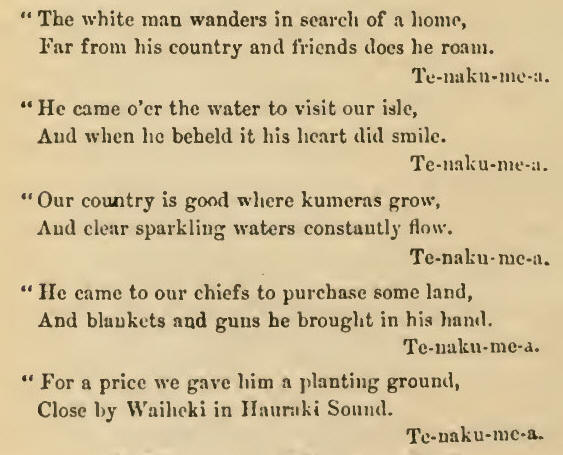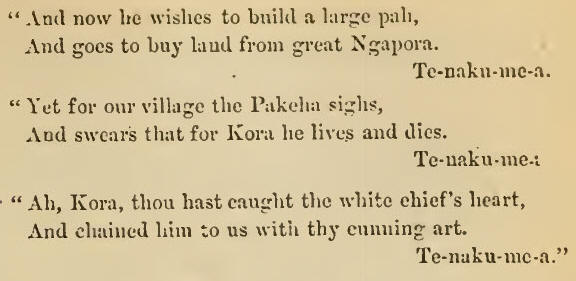|
We have rounded a headland
and shut out of sight the great Waipeha town. The crew settle down fairly to
their oars, and we are pulling through the harbour entrance, and have opened
up the Hanriki Gulf. We are making straight for the opposite shore, and
heading for the northern point of Waiheki, high land which we can see
distinctly some fourteen miles distant.
The day is magnificent, not a
cloud to be seen, the sun shines down with a genial warmth, it is a dead
calm, and the sea as smooth as a mirror, and as flat as one too, for no
swell comes in from the open sea: we might have been in a millpond. And very
lucky it was we had such weather, for had it come on to blow even a moderate
breeze we should have been compelled to lighten the boat, and poor Cook's
impedimenta would have found a watery burial, and some of ourselves a grave.
The Maories pulled well and
lustily, keeping time with their oars to a song which sometimes had one
word, sometimes two, as a chorus, which the crew took up and repeated as
they pulled the oar out of the water. These boat-songs were very often
unprovised, all save the refrain, and when the Pakeha was a passenger,
generally referred to him. All the native village gossip of the day, whether
social or political, came to light in these extemporised boat or canoe
songs; and if any new scandal was on the tapis, it was jubilantly given
forth in terse and unmistakable language. The Maori being an intense gossip,
has an insatiable curiosity to know everything that is going on, and
generally does manage to know.
The "best authority" in
native circles, and from whom the best supply of gossip was drawn, was
generally one of their own young chieftainesses, wedded for the time being
to a Waipeha or other Pakeha. I ought to tell you that in those old lawless
bygone days the chiefs generally made it a condition that the Pakeha who
took up his quarters with them should be respectably wived—that is,
according to Maori custom—and the Pakeha had to accept matrimony as one of
the conditions on which he was allowed to locate himself. The Maori
reasoning was simple as conclusive—the Pakeha once wived, he had then no
excuse for "paying attentions" beyond his own legitimate whare! Oh! sound
Maori knowledge of human nature.
This was my first experience
of a native crew and of their songs, but many were the songs I had heard
both in boat and in canoe ere the half-Maori, half-Pakeha settling of the
"early days" had passed away. and became exchanged for purely Saxon manners
and customs.
And now the crew are
improvising as fast as they are pulling, each rower, one after time other in
rotation, giving a line, and all repeating the refrain at the end of it.
I got Waipehia to translate
their song to me as it was sung, and I find it amongst my old manuscripts
thus converted into doggrel the same night before "turning in":


In this manner, when at the
oar, the natives take free licence in commenting on any of the Pakelia
idiosyncrasies and having a sly hit at them, and the more especially if the
Pakeha proclivities have taken the direction of admiring any of the village
native beauties would it be exultingly proclaimed. The allusion to Kora, I
discovered from Waipeha, was aimed at Cook, who, at the conclusion of the
song, when the last long prolonged ku-me-a had died away, thus delivered
himself.
"These savages must always
concoct some ribaldry or other of that kind. What a noise the creatures
make! Europeans would do twice the work with half the row."
One of Cook's peculiarities
was to run down the Maories. He had come to the country expecting to find
them a very easy race to deal with, whereas in his land speculations, and,
indeed, in every. thing else, he had discovered they were as acute as they
were intelligent, very ready and willing to sell bad land at a good price,
but always displaying a sturdy obstinacy in not selling good land at any
price at all.
Cook's remarks, therefore, on
the simple aborigines might be held to savour more of the sour grape order
than anything else. Waipeha, on other hand, always stood up manfully for
Tongata Maori.
"Come now, Mr. Cook," he
said, "don't be miming down the natives because that young lady's name was
brought on carpet. You can't deny these young fellows make capital boatmen,
and will work well for a whole day at the oar, happily and cheerfully, and
never grumbling one bit. For my part I would never think of exchanging them
for white men."
"Ah! but then you forget you
yourself have turned half-native. I almost expect to see you take to a flax
mat, bare legs, tattoo your face down to the very tip of your nose, and
forget how to speak your own language. I am morally convinced you are fast
coming to that, and when you do arrive at that delectable condition I
promise you to forego all my prejudices against the Maories in so far as to
hire you as one of my boat's crew, granting you free liberty to improvise at
your oar and deal in personalities to your heart's content."
"Ah well! There is no saying
what I may be reduced to yet. I shall take a note of your offer. But come
now, between ourselves, confess, Does not your aversion extend more to the
male gender than the female?"
But before Cook could make
any reply to this insinuation, the crew, who had been taking a spell of
quiet rowing, again broke out into song:

All end in a prolonged
shout—"W-hu-u-a".
There now!" exclaimed Cook,
"that is just a sample of the kind of stuff your favourites indulge in."
"All very fine to call it
stuff," I said, "but I rather imagine some of these little boxes of yours
'could a tale unfold' in the shape of feminine apparel if examined. I have
heard, I think, that Waiheki is famed for the beauty of its native ladies."
"And evidently you think they
are all purchasable for a few yards of printed calico," retorted Cook.
"Or a Panama hat; and ten to
one I'll find one in this little box of yours," said I, appropriating the
one nearest me, and commencing to open it.
Cook indulged in a quiet kind
of snigger to him-self while I was opening the box, but it did not escape me
that when all were watching what I was about to disclose, he adroitly got
hold of the only other box at hand and put it safely under the boat's thwart
behind his own feet, so that no one could get hold of it.
"Well," said he as I was in the act of opening the lid, ''turn it out and
let us all admire the new hat, or perhaps it is a gown done up in a small
compass."
"A key-bugle, I declare!" I
exclaimed, not a little surprised, and taken rather aback, as were all the
others, for we had never heard its notes b1low on Herekino beach.
"Ah well!" I said, "we shall
let you off the opening of any more boxes if you will only cheer us up with
some music. Come now, something appropriate: 'The King of the Cannibal
Islands,' or, perhaps still more appropriate, what would you say to 'Love
lies bleeding?'
Cook took the instrument, put
it to his lips, breathed through the bugle, touched all the keys, giving his
hand a jerk upwards as he put it to his lips, and just as we expected to
hear the first note ring out and float along the smooth waters, he suddenly
stretched out the other hand, and seized the case, and before we knew what
he was about, the bugle was safely replaced, the box closed, and it was put
under the thwart to keep the other box company.
When Cook said "No" in this
pronounced and Practical manner it was a decision a la Cook, final and
irrevocable, so not another word was said, Waipeha merely remarking — "Well,
you must sound our approach when we near the Delhi, for I am going to leave
you all on board whilst I go on shore to see how my Maori workmen are
getting on dragging down the cargo; the last log was to have been in the
water today."
The Delhi was a barque of
some 500 tons which he was loading for the Australian market, for in those
days Waiheld had many a stately kouri growing on it.
As not a breath of wind had
sprung up there was no respite to the rowers, and well and lustily they gave
way to their oars. Occasionally they would rest for a minute or two and
refresh themselves with a drink of water from a calabash, and then pull away
as vigorously as ever, and as we had two spare hands the crew had a spell by
turns.
Waipelia chatted away with
them during any intermission of their songs, as he wanted to post himself up
about the chiefs of the tribe with whom we should come in contact, with
reference to the object of our expedition.
The boat at last neared the
opposite shore, and as we were passing round the point of a small islet Cook
took out his bugle, and the notes of a rather startling blast were echoed
from the steep shore ahead of us, and all at once we opened up a passage
between the islet and Wailieki, and we saw the Delhi at anchor in the
fairway channel with a large raft of timber at her stern.
On coming alongside, Cook's
warning notes having heralded our approach, we were welcomed, after a
sailor's fashion, by the captain, who was only too glad to encounter any one
who would relieve the monotony of his situation, and give him news of the
outer world.
After dinner it was
discovered that it would be too late, on Waipeha's return from visiting his
timber-draggers, to proceed farther on our journey that day, so we
determined to accompany him on shore, and return again and spend the night
on board, and make an early start of it the next morning. |

